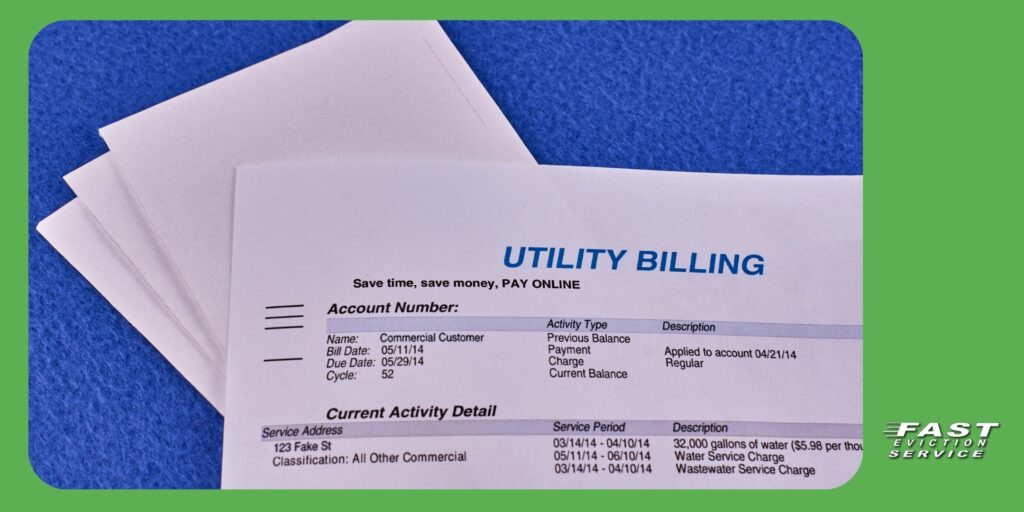Updated 1/14/25
One of the most common questions landlords encounter during rental screenings is, “Does rent include utilities?” For tenants, this question is key to understanding their financial responsibilities and planning their budgets. For landlords, deciding whether or not to include utilities in rent can impact property management, profitability, and tenant relationships.

Understanding the nuances of utilities-included rental agreements and the pros and cons of this arrangement can help landlords navigate these discussions effectively. Whether you’re a landlord offering utilities-included apartments or considering the best approach for your rental property, this article provides actionable insights to help you make informed decisions.
Table of Contents
- What Does “Utilities Included” Mean in a Rental Agreement?
- Types of Utilities Typically Included in Rent
- Why Landlords Offer Utilities Included Apartments
- Pros of Renting Utilities Included Properties
- Cons of Utilities Included Rentals
- How Utilities Included Rentals Impact Budgeting
- Who Are Utilities Included Rentals Ideal For?
- Questions to Ask About Utilities Included Leases
- Utilities Included Rentals vs. Paying Separately: A Comparison
- How to Decide if Utilities Included Rentals Are Right for You
What Does “Utilities Included” Mean in a Rental Agreement?
When a lease states that utilities are included, it means the landlord covers specific utility costs as part of the rent. This arrangement simplifies things for tenants, as they don’t need to set up separate utility accounts or worry about fluctuating bills. However, it also means landlords must take responsibility for paying utility providers directly.
Commonly included utilities can range from water and electricity to gas and even internet. It’s essential to outline clearly in the rental agreement which utilities are included to avoid confusion.
Types of Utilities Typically Included in Rent
Utilities included in rent often vary depending on the property type and location. The most commonly included utilities are:
- Water and Sewer: Frequently included in multifamily properties due to shared systems.
- Electricity and Gas: Sometimes included in smaller units or short-term rentals.
- Trash Collection: Commonly bundled in rent agreements.
- Internet and Cable: Occasionally included as a perk in premium or student rentals.
Clarifying these details in the lease ensures transparency and avoids disputes.
Why Landlords Offer Utilities Included Apartments
Landlords often include utilities in rent for several reasons. First, it simplifies tenant billing and enhances convenience, making the property more appealing. Utilities-included arrangements can attract renters like students or short-term tenants who prioritize ease over cost.
Additionally, including utilities gives landlords greater control over utility accounts and ensures bills are paid on time. This is particularly useful in properties with shared meters where it’s difficult to separate individual tenant usage.
Pros of Renting Utilities Included Properties
From a tenant’s perspective, utilities-included rentals simplify budgeting and eliminate surprises from fluctuating utility costs. For landlords, this arrangement can:
- Increase property marketability by attracting tenants seeking convenience.
- Reduce tenant turnover by creating a hassle-free living experience.
- Ensure utility accounts remain in good standing since landlords handle payments directly.
Cons of Utilities Included Rentals
Despite the benefits, there are drawbacks to offering utilities included apartments. For landlords, one challenge is estimating utility usage accurately. Overuse by tenants can lead to higher-than-expected costs, which may eat into profits.
Another downside is the potential for disputes over what constitutes reasonable usage. Tenants may also use more utilities than they would if they were paying separately. This arrangement requires careful planning and monitoring.
How Utilities Included Rentals Impact Budgeting
Utilities-included rentals simplify budgeting for tenants, but they also require landlords to set accurate rent rates to cover expenses. The average cost of utilities in rental properties can vary based on location, property size, and tenant behavior. Landlords should research utility costs in their area to create a fair and sustainable pricing model.
When calculating rent, it’s essential to consider seasonal fluctuations in utility usage, such as higher electricity bills during summer months. Budgeting with utilities-included housing requires landlords to account for these variables to avoid financial strain.
Who Are Utilities Included Rentals Ideal For?
Utilities included apartments are especially appealing to certain demographics. Students, for example, often prefer rent with all bills paid because it simplifies their financial responsibilities. Similarly, short-term rentals with utilities included attract business travelers and those seeking temporary housing.
This arrangement is also ideal for tenants new to an area who may not want to deal with setting up utility accounts immediately. By understanding your target market, you can determine whether utilities-included rentals align with their needs.
Questions to Ask About Utilities Included Leases
Before agreeing to a utilities-included rental, tenants should ask questions to clarify expectations. As a landlord, being prepared to answer these questions helps build trust. Common inquiries include:
- Which utilities are covered under the rent?
- Are there limits on utility usage?
- What happens if utility bills exceed expectations?
Providing clear and honest answers ensures tenants understand the terms of the agreement, reducing the likelihood of disputes.
Utilities Included Rentals vs. Paying Separately: A Comparison
The debate between utilities-included apartments and paying separately often comes down to convenience versus control. Utilities-included arrangements simplify life for tenants, but they may cost slightly more due to landlords building in a buffer for potential overuse.
On the other hand, paying for utilities separately allows tenants to control their usage and potentially save money. Landlords benefit by avoiding unexpected utility expenses. Each approach has its merits, and landlords must weigh the options based on their property’s unique needs.
How to Decide if Utilities Included Rentals Are Right for You
Deciding whether to offer utilities-included housing depends on various factors, including property type, target market, and your financial goals. For landlords managing multifamily units or properties with shared meters, including utilities can simplify operations. However, those managing single-family homes may find it more practical to have tenants handle their utility accounts.
Consider conducting a cost-benefit analysis to determine the best approach for your property. Additionally, researching tenant preferences in your area can help you make a choice that aligns with market demand.
Frequently Asked Questions
What does utilities included mean?
It means specific utility costs, such as water, electricity, or internet, are covered by the landlord and bundled into the rent.
What are the benefits of utilities included apartments?
They simplify budgeting for tenants, enhance convenience, and ensure timely utility payments for landlords.
What is the average cost of utilities in rental properties?
Costs vary by location and property size but typically range from $100 to $200 per month for essentials like water, electricity, and gas.
Are utilities included apartments better for students?
Yes, students often prefer utilities-included apartments due to the simplicity and predictability of costs.
How do utilities-included rentals affect budgeting for landlords?
Landlords must carefully estimate utility costs and adjust rent accordingly to cover expenses without sacrificing profitability.
By understanding the implications of utilities-included rentals, landlords can make informed decisions that balance tenant satisfaction with financial sustainability. Whether you’re considering this approach or refining your current strategy, being prepared to handle questions about utilities ensures a positive rental experience for all parties involved.





